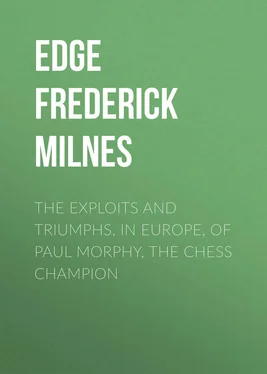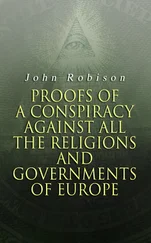Frederick Edge - The Exploits and Triumphs, in Europe, of Paul Morphy, the Chess Champion
Здесь есть возможность читать онлайн «Frederick Edge - The Exploits and Triumphs, in Europe, of Paul Morphy, the Chess Champion» — ознакомительный отрывок электронной книги совершенно бесплатно, а после прочтения отрывка купить полную версию. В некоторых случаях можно слушать аудио, скачать через торрент в формате fb2 и присутствует краткое содержание. Жанр: Развлечения, foreign_antique, foreign_prose, на английском языке. Описание произведения, (предисловие) а так же отзывы посетителей доступны на портале библиотеки ЛибКат.
- Название:The Exploits and Triumphs, in Europe, of Paul Morphy, the Chess Champion
- Автор:
- Жанр:
- Год:неизвестен
- ISBN:нет данных
- Рейтинг книги:4 / 5. Голосов: 1
-
Избранное:Добавить в избранное
- Отзывы:
-
Ваша оценка:
- 80
- 1
- 2
- 3
- 4
- 5
The Exploits and Triumphs, in Europe, of Paul Morphy, the Chess Champion: краткое содержание, описание и аннотация
Предлагаем к чтению аннотацию, описание, краткое содержание или предисловие (зависит от того, что написал сам автор книги «The Exploits and Triumphs, in Europe, of Paul Morphy, the Chess Champion»). Если вы не нашли необходимую информацию о книге — напишите в комментариях, мы постараемся отыскать её.
The Exploits and Triumphs, in Europe, of Paul Morphy, the Chess Champion — читать онлайн ознакомительный отрывок
Ниже представлен текст книги, разбитый по страницам. Система сохранения места последней прочитанной страницы, позволяет с удобством читать онлайн бесплатно книгу «The Exploits and Triumphs, in Europe, of Paul Morphy, the Chess Champion», без необходимости каждый раз заново искать на чём Вы остановились. Поставьте закладку, и сможете в любой момент перейти на страницу, на которой закончили чтение.
Интервал:
Закладка:
Arriving in Europe three months before Mr. Morphy, I was in some sort, – not from any consent or knowledge on his part, his avant courier ; and the fact of my having been one of the Secretaries at the New York Chess Congress, joined to my acquaintance with him, afforded me the opportunity of conversing frequently with prominent English players in reference to this new meteor in the chess firmament.
Shortly after my arrival in London, I called upon the Secretary of the St. George's Chess Club, Thomas Hampton, Esq., and introduced myself to him. Chess is a bond of brotherhood amongst all lovers of the noble game, as perfect as free masonry. It is a leveller of rank – title, wealth, nationality, politics, religion – all are forgotten across the board. Every chess player recognizes this, and none more so than Mr. Hampton, who gave me the warmest of welcomes. He told me that every Saturday there was a full attendance of members, and kindly invited me to visit the club on that day, promising to introduce me to Mr. Staunton. I was but too happy to accept this invitation, being desirous of learning how far the prowess of Paul Morphy was appreciated by one so eminent in the chess world.
My acquaintance with the young American was a passport of general interest to all present on the following Saturday. In addition to Mr. Staunton, I met there Herr Falkbeer, Messrs. Barnes, Bird, "Alter," and other luminaries, and many were the questions asked in reference to Mr. Morphy. But I am bound to say that the feeling with which he was regarded in the United States was not participated in by English players. I was told by one gentleman – "Mr. Morphy's games are very pretty, but they will not bear the test of analysis." Another said – and his opinion was universally endorsed – "It is quite possible that Mr. Morphy may arrive at the highest rank, nay, even that he may become a second Labourdonnais, but he cannot have the strength his admiring countrymen wish to believe. Chess requires many long years of attentive study, and frequent play with the best players, and neither of these your friend has had. Depend upon it he will find European amateurs very different opponents from those he has hitherto encountered." This rather nettled me, but it was reasonable and just. Any one possessing the slightest acquaintance with the game knows that it partakes more of hard, laborious application to arrive at first-rate skill, than of mere pastime. Very few of Morphy's games had been seen in Europe, and his opponents were not, certainly, of a class to rank with the Stauntons, Löwenthals, and Anderssens of the Old World. Was it reasonable to suppose that a youth, just out of his teens, who had devoted but little time to chess, and who was about to meet first-rate players for the first time, should possess the experience and lore of men double his age? At the present time, now that he has unmistakably proved himself the superior of all living players, I feel utterly at a loss to solve the problem of his skill. At college, until eighteen years old, what time could he find there, except out of school hours, for the required practice, and what antagonists worthy of him? From eighteen to twenty, he was engaged in reading for the bar. During that period he was as frequent a visitor at the chess club as circumstances would permit, but certainly not sufficiently so to increase his strength. Who were his antagonists? His father had almost entirely abandoned chess; Mr. Ernest Morphy had settled in "the West," and Mr. Rousseau, absorbed in the sterner duties of life, held the same relation to the game as Mr. Lewis in England. To one and all of his opponents, except these gentlemen, he could give the rook; and playing at odds is somewhat different from contending with even players. He met strong players for the first time at New York. Paulsen, Lichtenhein, Thompson, Montgomery, Marache were all northern players, and new to him, and vastly superior to the antagonists he had previously encountered. There is but one way to account for his annihilation of all precedent. His skill is intuitive, and I doubt much whether his prodigious memory has been of assistance to him. In answer to a gentleman in Paris as to whether he had not studied many works on chess, I heard him state that no author had been of much value to him, and that he was astonished at finding various positions and solutions given as novel – certain moves producing certain results, etc., for that he had made the same deductions himself, as necessary consequences . In like manner, Newton demonstrated, in his own mind, the problems of Euclid, the enunciations only being given; and I can think of no more suitable epithet for Morphy than to call him "the Newton of Chess."
But revenons à nos moutons . Morphy's achievements at the Congress in New York induced many to believe that America now possessed a champion capable of contending with the proficients of Europe, and it was proposed that he should be backed by the American Chess Association against any player who would take up the challenge. I am sorry to say that the action of certain prominent men prevented the gauntlet being thrown down. These gentlemen said, "He beats us because he is better versed in the openings, but such players as Löwenthal and Harrwitz will be too strong for him. He wants experience, and were we to make this national challenge, we should appear ridiculous when our champion is defeated, which he certainly would be." The proposal, however, got noised abroad, and the following paragraph appeared, in consequence, in the Illustrated London News:
2 2 Illustrated London News, December 26th, 1857.
"The American Chess Association, it is reported, are about to challenge any player in Europe to contest a match with the young victor in the late passage at arms, for from $2,000 to $5,000 a side, the place of meeting being New York. If the battle-ground were to be London or Paris, there can be little doubt, we apprehend, that a European champion would be found; but the best players in Europe are not chess professionals, but have other and more serious avocations, the interests of which forbid such an expenditure of time as is required for a voyage to the United States and back again."
I would say, by way of parenthesis, that such a being as a professional chess player does not exist in the United States. Paulsen is a tobacco broker, with tendencies to speculating in "corner lots." (Western men know what that means.) Lichtenhein deals in dry-goods, dry wines and Italian opera; Thompson is the proprietor of a magnificent restaurant; Colonel Mead devotes himself to democratic cabals at the New York Hotel; Fiske is an admixture of the Chess Monthly, the Astor Library and Scandinavian literature; Perrin and Marache are bothered daily with banks, "bears" and "bulls." Chess professionals, indeed! they do not grow in the United States.
Mr. Morphy returned to his native city without any further action having been taken, but the New Orleans Chess Club determined that the challenge should be made, and they addressed the following letter to Mr. Staunton, at the commencement of last year:
New Orleans, February 4, 1858 .Howard Staunton, Esq.,
Sir, – On behalf of the New Orleans Chess Club, and in compliance with the instructions of that body, we, the undersigned committee, have the honor to invite you to visit our city, and there meet Mr. Paul Morphy in a chess match. In transmitting this invitation, permit us to observe, that we are prompted no less by the desire to become personally acquainted with one whom we have so long admired, than by the very natural anxiety to ascertain the strength of our American players by the decisive criterion of actual conflict over the board.
We can see no valid reason why an exercise so intellectual and ennobling as chess, should be excluded from the generous rivalry which exists between the Old and the New World, in all branches of human knowledge and industry. That the spirit of emulation from which this rivalry arises has not, hitherto, been made to embrace our chivalrous game, may be mainly ascribed to the fact that, although the general attention paid to chess in the United States during the last fifteen years has produced a number of fine players, yet their relative force remained undetermined, and none could assert an indisputable right to pre-eminence. The late Chess Congress has, however, removed this obstacle, by finally settling the claims of the several aspirants to the championship; and it must now be a matter of general desire to fix, by actual contest with the best European amateurs, the rank which American players shall hold in the hierarchy of chess.
Читать дальшеИнтервал:
Закладка:
Похожие книги на «The Exploits and Triumphs, in Europe, of Paul Morphy, the Chess Champion»
Представляем Вашему вниманию похожие книги на «The Exploits and Triumphs, in Europe, of Paul Morphy, the Chess Champion» списком для выбора. Мы отобрали схожую по названию и смыслу литературу в надежде предоставить читателям больше вариантов отыскать новые, интересные, ещё непрочитанные произведения.
Обсуждение, отзывы о книге «The Exploits and Triumphs, in Europe, of Paul Morphy, the Chess Champion» и просто собственные мнения читателей. Оставьте ваши комментарии, напишите, что Вы думаете о произведении, его смысле или главных героях. Укажите что конкретно понравилось, а что нет, и почему Вы так считаете.












